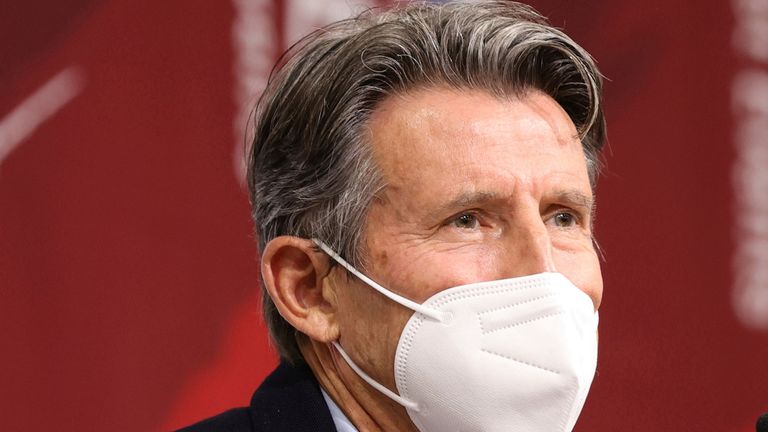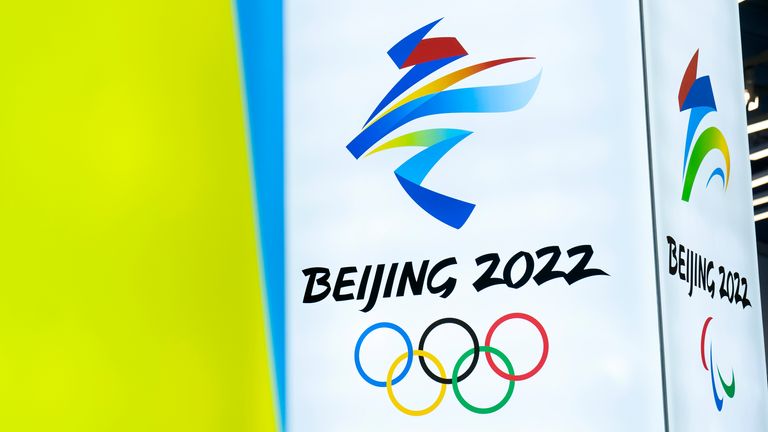Winter Olympics: Lord Coe says diplomatic boycott of Beijing Games is 'meaningless'
Coe: "Boycotts, on balance, are historically illiterate and intellectually dishonest. A political boycott is, frankly, meaningless"; five countries have so far chosen not to send government delegates to the Games next year over criticism about China's human rights record
Friday 31 December 2021 06:36, UK
World Athletics president Sebastian Coe says he takes human rights "very seriously" but that Britain's diplomatic boycott of next year's Beijing Winter Olympics is "meaningless".
The United States, Lithuania, Australia and Canada have also announced a diplomatic boycott of the Games over China's human rights record, a stand that China dismissed as "political posturing".
Coe drew criticism over his comments last week when he said he was "philosophically opposed".
"Boycotts, on balance, are historically illiterate and intellectually dishonest. A political boycott is, frankly, meaningless," Coe said.
- How Worthington & Shriever made BMX cool again
- Tokyo Olympics: Team GB's medal winners
- Peaty wants to set 'immortal' record
"That's not to be an apologist for countries that do not conform to the basic standards around human rights... I'm not insouciant or cavalier about human rights. I take them very seriously.
Trending
- Fury rages: I was robbed... Usyk got a Christmas gift!
- Usyk denies Fury in intense world championship rematch
- Highlights: Usyk overcomes Fury in epic heavyweight rematch
- 'He got a Christmas gift!' | Fury left fuming in post-fight press conference
- Papers: Arsenal, Man City and Bayern in three-way battle for Olmo
- Littler tested on emotional Worlds return: 'Never felt anything like that'
- Big fight reaction: What next for Fury and Usyk after contentious call?
- World Darts Championship schedule: Anderson headlines Sunday's action
- Transfer Centre LIVE! Dele says goodbye to Everton - Como next?
- PL Predictions: Liverpool to edge Spurs on Super Sunday
"I don't think over the long haul (boycotts) actually achieve a great deal. There are always unintended consequences. And at the end of the day, the people that most suffer in all that are the athletes."
The Beijing Games begin on February 4 and run until February 20.
Earlier in December, Prime Minister Boris Johnson confirmed the UK would not be sending any delegates to the Chinese capital for next year's Games, and therefore there would "effectively" be a boycott.
He said: "There will be effectively a diplomatic boycott of the Winter Olympics in Beijing, no ministers are expected to attend and no officials.
"I do not think that sporting boycotts are sensible and that remains the policy of the government.
"The government has no hesitation in raising these issues with China, as I did with President Xi [Jinping] the last time I talked to him."
Recently, Coe defended the decision to add another Diamond League event in China next year.
The announcement came in the wake of the Women's Tennis Association suspending tournaments in the country over concerns for Peng Shuai, the Chinese tennis star who in a November social media post attributed to her accused a former top Communist Party official of forcing her into sex.
In a video posted by Lianhe Zaobao, a Singaporean Chinese-language newspaper, Shuai recently denied saying she was sexually assaulted.
"We are, of course, concerned for the welfare of all athletes," Coe said. "I believe all athletes should be free to voice their concerns and sports should never flinch from making those points.
"But it is still better to have open dialogue and sporting relationships than pulling up the drawbridge. Very few other sectors choose to do that. Sport has always played a very important part in the deft diplomacy that has been historically proven to be very successful at times.
"They [boycotts] tend not to achieve what they set out to achieve. Diplomatic boycotts, while not really impacting the athlete, are not really particularly strong gestures.
"It's really important the Diamond League has a foothold in all our big athletics nations.
"You make all sorts of balances and judgments when you are looking at your competition schedule and your programming. We consider that to be an important part of our sport."




